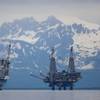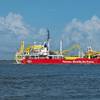EnerSea Transport LLC, in association with its maritime partners, Kawasaki Kisen Kaisha, Ltd. ("K"Line) and Hyundai Heavy Industries Co., Ltd. (HHI), announced today that its VOTRANS gas carrier has achieved "Class Approval in Principle" (AIP) from ABS (American Bureau of Shipping). This marks a major milestone in the companies' ability to deliver compressed natural gas (CNG) through the world's first commercial large scale marine gas transport system of its kind.
"Class Approval in Principle is further independent validation of VOTRANS' solid engineering foundation and allows us to launch our industry-leading CNG capabilities," said EnerSea's Managing Director Paul Britton.
This achievement enables EnerSea to commence commercial deployment of its VOTRANS gas transport services to industry at a time when current and projected gas supplies in the world's major energy-consuming countries are approaching critical shortfalls. With U.S. natural gas demand projected to reach 32 trillion cubic feet by 2020, industry and government alike are seeking innovative solutions.
"Undeveloped gas resources in the deepwater Gulf of Mexico, Atlantic Canada, Alaska, Trinidad, Venezuela and Colombia are all ideal prospects for helping meet U.S. gas demand using EnerSea's transport services," explained Britton. EnerSea's plans for deployment will enable gas operators to begin shipping these new volumes in early 2007.
EnerSea and its partners recently concluded a comprehensive engineering program that started in June 2002 and culminated with the AIP award for its "V800" class vessel design. The V800 is designed to carry 700 to 800 million cubic feet (mmcf) of natural gas, depending on the specific gas composition. EnerSea intends to use this vessel to support economic gas transportation services for applications with average supply rates ranging from 300 to 500 mmcf per day to markets up to 2,500 miles away.
EnerSea also offers V600 and V1000 vessel classes that will enable the company to support production rates ranging from 150 to 700 mmcf per day over distances up to 3,000 miles.
Featured videos

Unlock Onboard Data Efficiencies

Inmarsat Enhances Service to Drive Digitalization

Tracking Foreign Vessels Working in the U.S. Jones Act Market
Subscribe for
Maritime Reporter E-News
Maritime Reporter E-News is the maritime industry's largest circulation and most authoritative ENews Service, delivered to your Email five times per week








